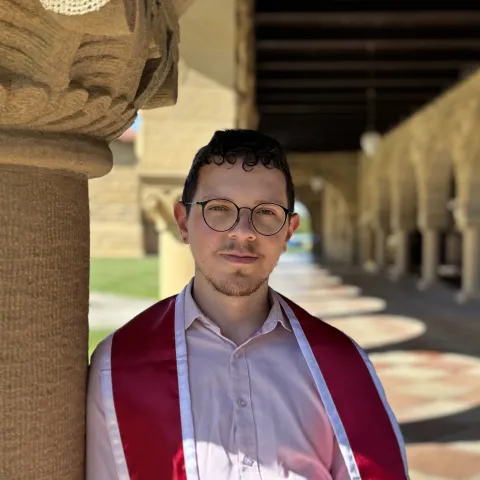
Giácomo Rabaiolli Ramos

While my undergraduate degrees were in Political Science and Anthropology, I have always been fascinated by the interdisciplinary field of Education Studies. I knew that I wanted to pursue further studies—perhaps even a PhD—but I was unsure that I had the required skills and a somewhat clearly defined research field. Thus, I chose to apply for master’s programs to equip myself with the substantive and methodological knowledge that would get me better ready for doctoral studies. While I weighed my options, the International Education Policy Analysis program at Stanford became a clear first choice.
The GCE/IEPA master’s program combined various attractive elements, from the funding opportunities to the curriculum structure and the research opportunities. As a Lemann Fellow, expenses such as tuition, housing, and health insurance were fully covered for me, which allowed me to join the program despite my financial background. Additionally, the GCE/IEPA curriculum uniquely combined core classes such as Introduction to International and Comparative Education with methodological courses like Introduction to Qualitative Methods and highly interesting electives, through which I did everything from creating a digital citizenship curriculum for a nonprofit organization to crafting a policy review on measures to reduce dropout rates among low-income high school students. Furthermore, I had the chance to work in two research assistantships during my year at Stanford. First, I joined the John W. Gardner Center for Youth and Their Communities, researching how San Mateo County bureaucrats handle data in their community engagement efforts. Then, I became a research assistant for Professor Guilherme Lichand, working on a project that directly benefits a third-sector institution in Brazil focused on education technology. Thus, the GCE/IEPA program provided me with classes and research that prepared me for a doctoral program, all while having financial support.
However, it would be amiss to talk about the GCE/IEPA program without mentioning its key feature: the master’s paper. Throughout the year, I worked with a team of outstanding professors and teaching assistants who helped me conceptualize, conduct, and write up a research project, including primary and secondary data collection. I lack the words to explain how supportive my advising team was and how much they encouraged me to deeply think about my research interests and findings. At the end of the program, I had written a research paper on how ideology shapes civic education efforts by nongovernmental organizations and the State in Brazil. Core research components, such as a literature review and a conceptual framework, became much clearer to me. I have recently submitted my paper to a research journal and hope to publish it in the coming months.
As I leave Stanford, I have not only secured a full-time job, but also joined a Brazilian research group that studies the influence of conservatism in education policy and practice across four countries, which will allow me to stay engaged in the field of comparative education. I feel much more ready to make meaningful contributions to the field of education, be it through advancing theory or informing policy and practice. I am more confident about my knowledge of the field of Education Studies, have more experience with qualitative and quantitative research methods, and better understand what my research interests are. None of this would be possible without the amazing experiences that I had with my advising and teaching teams as well as the world-class student cohort that comprised the GCE/IEPA program.
